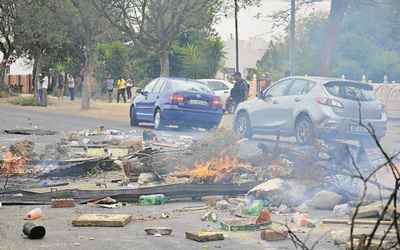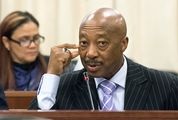AS anticipated by many, conflicts have again erupted on university and other tertiary campuses. The issues behind the upheavals are numerous and complex but have lately been characterised by violent clashes that include the destruction of property.
There have also been instances where the confrontations have taken on a racial tone that undermines efforts to unite student bodies and university communities.
Some of the grievances are premised on that very project of unity, as the protesters have questioned whether it has failed to bring about transformation. These questions go beyond the material needs of students and workers relating to the affordability of tuition fees and outsourcing.
It is important that such questions are asked and attempts are made to answer them in academic environments because they are supposed to be a well of intellectual enrichment and personal development. It is also beneficial for students, who are in their formative years, to try to answer difficult questions about the values and character of the South African nation.
Having said this, though, we must not forget the multi-dimensional character of our society, and that in this context there will be vastly differing views about how to tackle such questions. Views are heavily influenced by the life experiences, individual and collective, of everyone affected or participating.
Precisely because of this, it is very important that the institutional framework governing universities and the country as a whole is able to respond adequately to the challenge it now faces.
Failure to manage the situation appropriately, such as the disproportionate use of institutional or militarised power by universities and the state, is always likely to trigger a violent reaction.
Similarly, students have a responsibility to launch robust protests without hindering the rights of others, especially those who may differ with them.
The same applies to those students who may find the protests problematic, either for personal or ideological reasons.
It is disappointing that Higher Education Minister Blade Nzimande has not intervened.
His absence gives the impression that he either does not grasp the depth of the issues involved or has no legitimacy to lead efforts to deal with them.
His past statements have shown a complete disconnect from the issues students are unhappy about, and that is greater state control of higher education.
This desire for control is rooted in ideological dogma, the very antithesis of independent intellectual development.
It is supported by some who are disillusioned with the leadership of universities. But they may later regret their quest for control when the exigencies of trying to propagate free ideas and knowledge under the strictures of politicised state power become apparent. All this happens in a very difficult period in SA. Student protests have revived questions relating to the country’s transition.
They have the potential to unravel more than just universities. Society is becoming polarised on the basis of the positions that are being taken either in support of or in opposition to the protests.
It is time for political leaders all the way up to President Jacob Zuma to play the role expected of them. Their first task is to listen to all sides and mediate a conversation towards sustainable solutions that create a true sense of community in universities. There might be lessons for society as a whole in this process.
Failure of leadership — whether by Mr Nzimande, university management or political leaders — will have grave consequences because an orgy of violence can be triggered by one incident. Its consequences are too ghastly to contemplate.

North West University students throw stones at police officers during a protest in October last year. Picture: SOWETAN
AS anticipated by many, conflicts have again erupted on university and other tertiary campuses. The issues behind the upheavals are numerous and complex but have lately been characterised by violent clashes that include the destruction of property.
There have also been instances where the confrontations have taken on a racial tone that undermines efforts to unite student bodies and university communities.
Some of the grievances are premised on that very project of unity, as the protesters have questioned whether it has failed to bring about transformation. These questions go beyond the material needs of students and workers relating to the affordability of tuition fees and outsourcing.
It is important that such questions are asked and attempts are made to answer them in academic environments because they are supposed to be a well of intellectual enrichment and personal development. It is also beneficial for students, who are in their formative years, to try to answer difficult questions about the values and character of the South African nation.
Having said this, though, we must not forget the multi-dimensional character of our society, and that in this context there will be vastly differing views about how to tackle such questions. Views are heavily influenced by the life experiences, individual and collective, of everyone affected or participating.
Precisely because of this, it is very important that the institutional framework governing universities and the country as a whole is able to respond adequately to the challenge it now faces.
Failure to manage the situation appropriately, such as the disproportionate use of institutional or militarised power by universities and the state, is always likely to trigger a violent reaction.
Similarly, students have a responsibility to launch robust protests without hindering the rights of others, especially those who may differ with them.
The same applies to those students who may find the protests problematic, either for personal or ideological reasons.
It is disappointing that Higher Education Minister Blade Nzimande has not intervened.
His absence gives the impression that he either does not grasp the depth of the issues involved or has no legitimacy to lead efforts to deal with them.
His past statements have shown a complete disconnect from the issues students are unhappy about, and that is greater state control of higher education.
This desire for control is rooted in ideological dogma, the very antithesis of independent intellectual development.
It is supported by some who are disillusioned with the leadership of universities. But they may later regret their quest for control when the exigencies of trying to propagate free ideas and knowledge under the strictures of politicised state power become apparent. All this happens in a very difficult period in SA. Student protests have revived questions relating to the country’s transition.
They have the potential to unravel more than just universities. Society is becoming polarised on the basis of the positions that are being taken either in support of or in opposition to the protests.
It is time for political leaders all the way up to President Jacob Zuma to play the role expected of them. Their first task is to listen to all sides and mediate a conversation towards sustainable solutions that create a true sense of community in universities. There might be lessons for society as a whole in this process.
Failure of leadership — whether by Mr Nzimande, university management or political leaders — will have grave consequences because an orgy of violence can be triggered by one incident. Its consequences are too ghastly to contemplate.



















Change: 0.91%
Change: 0.81%
Change: 2.99%
Change: -0.19%
Change: 2.23%
Data supplied by Profile Data
Change: -0.27%
Change: 0.35%
Change: 0.91%
Change: 0.00%
Change: 0.09%
Data supplied by Profile Data
Change: -0.32%
Change: -0.29%
Change: -0.28%
Change: -0.37%
Change: 0.57%
Data supplied by Profile Data
Change: 0.55%
Change: 2.04%
Change: 0.64%
Change: 3.61%
Change: 4.08%
Data supplied by Profile Data